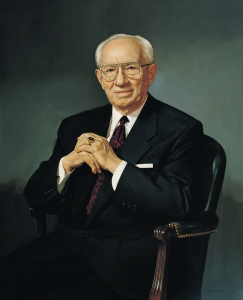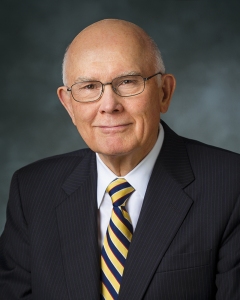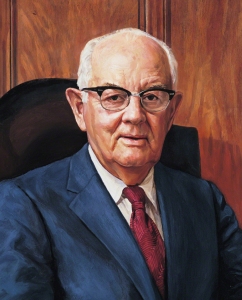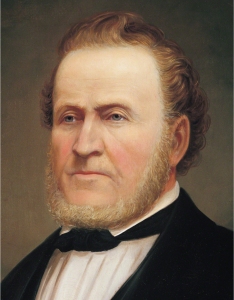Thomas S. Monson
General Conference, Oct. 2008 Priesthood Session
“Many areas of the world have experienced difficult economic times. Businesses have failed, jobs have been lost, and investments have been jeopardized. We must make certain that those for whom we share responsibility do not go hungry or unclothed or unsheltered. When the priesthood of this Church works together as one in meeting these vexing conditions, near miracles take place. “We urge all Latter-day Saints to be prudent in their planning, to be conservative in their living, and to avoid excessive or unnecessary debt. ”
“That Noble Gift—Love at Home”
“Many more people could ride out the storm-tossed waves in their economic lives if they had their year’s supply of food … and were debt-free. Today we find that many have followed this counsel in reverse: they have at least a year’s supply of debt and are food-free.”
“Models to Follow”
“Noah heeded God’s command to build an ark…that they might be saved from the flood waters. Yet there was no evidence of rain and flood. His actions were considered irrational. The sun was shining and life moved forward as usual. But time ran out. The floods came, the disobedient were drowned. When God speaks and we obey, we will always be right.”
“True to the Faith”
“Avoid the philosophy that yesterday’s luxuries have become today’s necessities. They aren’t necessities until we make them so. Many enter into long-term debt only to find that changes occur; people become ill or incapacitated, companies fail or downsize, jobs are lost, natural disasters befall us. For many reasons, payments on large amounts of debt can no longer be made. Our debt becomes as a Damocles sword hanging over our heads and threatening to destroy us.”
“Guiding Principals of Personal and Family Welfare”
“Recent surveys of Church members have shown a serious erosion in the number of families who have a year’s supply of life’s necessities. Most members plan to do it. Too few have begun. . . . It is our sacred duty to care for our families, including our extended families.”
Gordon B. Hinckley
“To the Boys and to the Men”
“There is a portent of stormy weather ahead to which we had better give heed…No one knows when emergencies will strike…Set your houses in order. If you have paid your debts, if you have a reserve, even though it be small, then should storms howl about your head, you will have shelter for your wife and children and peace in your hearts. That’s all I have to say about it, but I wish to say it with all the emphasis of which I am capable.”
…”And there shall arise after them seven years of famine … And God will shortly bring it to pass.’ Now brethren, I want to make it very clear that I am not prophesying, that I am not predicting years of famine in the future. But, I am suggesting that the time has come to get our houses in order … avoid debt to the extent possible. Pay off debt as quickly as you can, and free yourselves from bondage… There is a portent of stormy weather ahead to which we had better give head. We are carrying a message of self reliance throughout the Church… I urge you brethren to look to the condition of our finances…”
“To Men of the Priesthood”
“Everyone who owns a home recognizes the need for fire insurance. We hope and pray that there will never be a fire. Nevertheless, we pay for insurance to cover such a catastrophe, should it occur. We ought to do the same with reference to family welfare.”
The best place to have some food set aside is within our homes, together with a little money in savings. The best welfare program is our own welfare program. Five or six cans of wheat in the home are better than a bushel in the welfare granary. … We can begin with a one week’s food supply and gradually build it to a month, and then to three months. I am speaking now of food to cover basic needs.”
“Sin Will Not Prevail”
“The kingdom of heaven and the kingdom of God on the earth will be combined together at Christ’s coming – and that time is not far distant. How I wish we could get the vision of this work, the genius of it, and realize the nearness of that great event. I am sure it would have a sobering effect upon us if we realized what is before us.”
“The Times in Which We Live”
“As we have been continuously counseled for more than 60 years, let us have some food set aside that would sustain us for a time in case of need. But let us not panic nor go to extremes. Let us be prudent in every respect. And, above all, my brothers and sisters, let us move forward with faith in the Living God and His Beloved Son”
…”Peace is fragile, civilization itself is fragile. The economy is particularly vulnerable…”I do not know what the future holds. I do not wish to sound negative, but I wish to remind you of the warnings of scripture and the teachings of the prophets which we have had constantly before us. I cannot forget the great lesson of Pharaoh’s dream of the fat and lean kine and of the full and withered stalks of corn. I cannot dismiss from my mind the grim warnings of the Lord as set forth in the 24th chapter of Matthew. I am familiar, as are you, with the declarations of modern revelation that the time will come when the earth will be cleansed and there will be indescribable distress, with weeping and mourning and lamentation. . . . Now, I do not wish to be an alarmist. I do not wish to be a prophet of doom. I am optimistic. I do not believe the time is here when an all-consuming calamity will overtake us. I earnestly pray that it may not. “As we have been continuously counseled for more than 60 years, let us have some food set aside that would sustain us for a time in case of need. But let us not panic nor go to extremes. Let us be prudent in every respect. And, above all, my brothers and sisters, let us move forward with faith in the Living God and His Beloved Son…
Conference Report, October 1936
When the Church welfare program was first announced in 1936, the First Presidency made this statement:
“Our primary purpose was to set up, insofar as possible, a system under which the curse of idleness would be done away with, the evils of the dole abolished, and independence, industry, thrift, and self-respect be once more established amongst our people. The aim of the Church is to help people to help themselves. Work is to be re-enthroned as a ruling principle in the lives of our Church membership.”
Henry B. Eyring
“Spiritual Preparedness: Start Early and Be Steady”
But there is another even more important preparation we must make for tests that are certain to come to each of us. That preparation must be started far in advance because it takes time. What we will need then can’t be bought. It can’t be borrowed. It doesn’t store well. And it has to have been used regularly and recently. What we will need in our day of testing is a spiritual preparation. It is to have developed faith in Jesus Christ so powerful that we can pass the test of life upon which everything for us in eternity depends. …So, the great test of life is to see whether we will hearken to and obey God’s commands in the midst of the storms of life. It is not to endure storms, but to choose the right while they rage. …However much faith to obey God we now have, we will need to strengthen it continually and keep it refreshed constantly. We can do that by deciding now to be more quick to obey and more determined to endure. Learning to start early and to be steady are the keys to spiritual preparation. Procrastination and inconsistency are its mortal enemies.
“The great test of life is to see whether we will hearken to and obey God’s commands in the midst of the storms of life.”
The welfare handbook instructs, “(We must) earnestly teach and urge members to be self-sustaining to the fullest extent of their power. No Latter-day Saint will … voluntarily shift from himself the burden of his own support. So long as he can, under the inspiration of the Almighty and with his own labors, he will supply himself with the necessities of life.” (1952, p. 2.)
Boyd K. Packer
“Self-reliance”, from a fireside address delivered at Brigham Young University, May 2, 1975
I have become very anxious over the amount of counseling that we seem to need in the Church, and the network of counseling services that we keep building up—without once emphasizing the principle of self-reliance as it is understood in the welfare program. There are too many in the Church who seem to be totally dependent, emotionally and spiritually, upon others. They subsist on some kind of emotional welfare. They are unwilling to sustain themselves. They become so dependent that they endlessly need to be shored up, lifted up, endlessly need encouragement, and they contribute little of their own.
I have been concerned that we may be on the verge of doing to ourselves emotionally (and therefore spiritually) what we have been working so hard for generations to avoid materially. If we lose our emotional and spiritual self-reliance, we can be weakened quite as much, perhaps even more, than when we become dependent materially. On one hand, we counsel bishops to avoid abuses in the Church welfare program. On the other hand, we seem to dole out counsel and advice without the slightest thought that the member should solve the problem himself or turn to his family. Only when those resources are inadequate should he turn to the Church.
We recognize at once that it would be folly to develop welfare production projects to totally sustain all of the members of the Church in every material need. We ought likewise to be very thoughtful before we develop a vast network of counseling programs with all of the bishops and branch presidents and everyone else doling out counsel in an effort to totally sustain our members in every emotional need.
If we are not careful we can lose the power of individual revelation. The Lord said to Oliver Cowdery, and it has meaning for all of us:
“Behold, you have not understood; you have supposed that I would give it unto you, when you took no thought save it was to ask me.
“But, behold, I say unto you, that you must study it out in your mind; then you must ask me if it be right, and if it is right I will cause that your bosom shall burn within you; therefore, you shall feel that it is right.
“But if it be not right you shall have no such feelings, but you shall have a stupor of thought that shall cause you to forget the thing which is wrong.” D&C 9: 7–9
 Has it occurred to you that many problems can be solved by reading the scriptures? We should all personally be familiar with the revelations. As part of your emotional self-reliance, read the scriptures.
Has it occurred to you that many problems can be solved by reading the scriptures? We should all personally be familiar with the revelations. As part of your emotional self-reliance, read the scriptures.
Marion G. Romney
Conference Reports, April 1975, p. 165
I do not want to be a calamity howler. I don’t know in detail what’s going to happen in the future. I know what the prophets have predicted. But I tell you that the welfare program, organized to enable us to take care of our own needs, has not yet performed the function that it was set up to perform. We will see the day when we live on what we produce.”
“The Celestial Nature of Self-Reliance”
“We lose our life by serving and lifting others, this is the way to experience the only true and lasting happiness. Service is not something we endure on this earth so we can earn the right to live in the celestial kingdom. Service is the very fiber of which an exalted life in the celestial kingdom is made. Can we see how critical self-reliance becomes when looked upon as the prerequisite to service, when we also know service is what godhood is all about? Without self-reliance one cannot exercise these innate desires to serve. How can we give if there is nothing there? Food for the hungry cannot come from an empty purse. Support and understanding cannot come from the emotionally starved. Teaching cannot come from the unlearned. And most important of all, spiritual guidance cannot come from the weak.”
“Church Welfare Services’ Basic Principles,” Ensign, May 1976
“My faith does not lead me,” President Young continued, “to think the Lord will provide us with roast pigs, bread already buttered, etc.; he will give us the ability to raise the grain, to obtain the fruits of the earth, to make habitations, to procure a few boards to make a box, and when harvest comes, giving us the grain, it is for us to preserve it – to save the wheat until we have one, two, five, or seven years’ provisions on hand, until there is enough of the staff of life saved by the people to bread themselves and those who will come here seeking for safety. . . . [The fulfillment of that prophecy is yet in the future.] “Ye Latter-day Saints, learn to sustain yourselves. . . . “Implied faith and confidence in God is for you and me to do everything we can to sustain and preserve ourselves. . . . “You have learned a good deal, it is true; but learn more; learn to sustain yourselves; lay up grain and flour, and save it against a day of scarcity. . . . “Instead of searching after what the Lord is going to do for us, let us inquire what we can do for ourselves.” Discourses of Brigham Young, Deseret Book, 1966 ed., pp. 291–93)
Dallin H. Oaks
“Preparation for the Second Coming,”
We need to make both temporal and spiritual preparation for the events prophesied at the time of the Second Coming. And the preparation most likely to be neglected is the one less visible and more difficult—the spiritual. A 72-hour kit of temporal supplies may prove valuable for earthly challenges, but, as the foolish virgins learned to their sorrow, a 24-hour kit of spiritual preparation is of greater and more enduring value. We are living in the prophesied time “when peace shall be taken from the earth” (D&C 1:35), when “all things shall be in commotion” and “men’s hearts shall fail them” (D&C 88:91). There are many temporal causes of commotion, including wars and natural disasters, but an even greater cause of current “commotion” is spiritual.
D&C 6:34, 36
“Fear not little flock; do good; let earth and hell combine against you, for if ye are built upon my rock, they cannot prevail. . .Look unto me in every thought; doubt not, fear not.”
George A. Smith
Journal of Discourses, vol. 12, p. 142.
“How on the face of the earth could a man enjoy his religion, when he had been told by the Lord how to prepare for a day of famine, when, instead of doing so, he had fooled away that which would have sustained him and his family.”
Conference Report, Apr. 1945, 136 – Teachings of Presidents of the Church, George Albert Smith, p. 60
I know of nothing of great importance that has happened in the world that the Lord through his prophets has not advised the people of beforehand, so that they have not been left in ignorance of what was to develop, but could plan their lives, if they would, to their advantage. . . . The case of Noah is in point. He was commanded of the Lord to build an ark in which the righteous might be preserved from the flood which was to come. Noah built the ark and preached repentance to his generation for a period of one hundred and twenty years, thus fully warning them. The people, however, were so wicked that they failed to heed the warning. Having their agency, they chose evil rather than righteousness. The rains descended, and the floods came, and only Noah and his family of eight souls were saved. All had been fully warned, but because of their wilfulness and their refusal to repent they were drowned. See Moses 8:13–30.
Spencer W. Kimball
Conference Report Oct. 1977
“No true Latter-Day Saint, while physically or emotionally able will voluntarily shift the burden of his own or his family’s well-being to someone else. So long as he can, under the inspiration of the Lord and with his own labors, he will supply himself and his family with the spiritual and temporal necessities of life.”
The Teachings of Spencer W. Kimball, p.375
“Maintain a year’s supply. The Lord has urged that his people save for the rainy days, prepare for the difficult times, and put away for emergencies, a year’s supply or more of bare necessities so that when comes the flood, the earthquake, the famine, the hurricane, the storms of life, our families can be sustained through the dark days. How many of us have complied with this? We strive with the Lord, finding many excuses: We do not have room for storage. The food spoils. We do not have the funds to do it. We do not like these common foods. It is not needed — there will always be someone to help in trouble. The government will come to the rescue. And some intend to obey but procrastinate.”
Conference Report, Apr. 1976, 170
“Consider the important (food storage) program which we must never forget nor put in the background. As we become more affluent and our bank accounts enlarge, there comes a feeling of security, and we feel sometimes that we do not need the supply that has been suggested by the Brethren. . . . We must remember that conditions could change and a year’s supply of basic commodities could be very much appreciated by us or others. So we would do well to listen to what we have been told and to follow it explicitly”
General Conference, April 1974, pp. 184–85
“The little gardens and the few trees are very valuable. I remember when the sisters used to say, ‘Well, but we could buy it at the store a lot cheaper than we can put it up.’ But that isn’t quite the answer, is it, Sister Spafford? Because there will come a time when there isn’t a store. I remember long years ago that I asked a very prominent grocer who had a chain of grocery stores, ‘How long would your supply of groceries last if you did not have trucks to bring in new supplies?’ And he said, ‘Maybe we could stretch it out two weeks from our storehouses and from our supplies.’ People could get awfully hungry after two weeks were over”
“Family Preparedness”
“We encourage families to have on hand this year’s supply; we say it over and over and over and repeat over and over the scripture of the Lord where he says, “Why call ye me, Lord, Lord and do not the things which I say?” How empty it is as they put their spirituality, so-called, into action and call him by his important names, but fail to do the things which he says.”
…”We encourage you to grow all the food that you feasibly can on your own property. Berry bushes, grapevines, fruit trees—plant them if your climate is right for their growth. Grow vegetables and eat them from your own yards. Even those residing in apartments or condominiums can generally grow a little food in pots and planters. Study the best methods of providing your own foods. Make your garden neat and attractive as well as productive. If there are children in your home, involve them in the process with assigned responsibilities…Develop your skills in your home preservation and storage. We reaffirm the previous counsel the Church has always given, to acquire and maintain a year’s supply—a year’s supply of the basic commodities for us. We encourage families to have on hand this year’s supply; and we say it over and over and over and repeat over and over the scripture of the Lord where He says, ‘Why call ye me, Lord, Lord, and do not the things which I say?’ How empty it is as they put their spirituality, so-called, into action and call him by his important names, but fail to do the things which he says.
Spencer W. Kimball, August 1976
“We want you to be ready with your personal storehouses filled with at least a year’s supply. You don’t argue why it cannot be done; you just plan to organize and get it done.”
“Welfare Services: The Gospel in Action,” Ensign, November 1977
‘Provident living’. . . implies the [conserving] of our resources, the wise planning of financial matters, full provision for personal health, and adequate preparation for education and career development, giving appropriate attention to home production and storage as well as the development of emotional resiliency. . . . If we live wisely and providently, we will be as safe as in the palm of His hand.
“Family Preparedness,”
Brethren and sisters, we’ve gathered here this morning to consider the important program which we must never forget nor put in the background. As we become more affluent and our bank accounts enlarge, there comes a feeling of security, and we feel sometimes that we do not need the supply that has been suggested by the Brethren. It lies there and deteriorates, we say. And suppose it does? We can reestablish it. We must remember that conditions could change and a year’s supply of basic commodities could be very much appreciated by us or others. So we would do well to listen to what we have been told and to follow it explicitly.
. . . There are some countries which prohibit savings or surpluses. We do not understand it, but it is true. And we honor, obey, and sustain the laws of the country which is ours. (See A of F 1:12.) Where it is permitted, though, which is most of the world, we should listen to the counsel of the Brethren and to the Lord.
Recognizing that the family is the basic unit of both the Church and society generally, we call upon Latter-day Saints everywhere to strengthen and beautify the home with renewed effort in these specific areas: food production, preservation, storage; the production and storage of nonfood items; fixup and cleanup of homes and surroundings. We wish to say another word about this in the next meeting. We encourage you to grow all the food that you feasibly can on your own property. Berry bushes, grapevines, fruit trees – plant them if your climate is right for their growth. Grow vegetables and eat them from your own yard. Even those residing in apartments or condominiums can generally grow a little food in pots and planters. Study the best methods of providing your own foods. Make your garden as neat and attractive as well as productive. If there are children in your home, involve them in the process with assigned responsibilities.
What President Romney has just said is basic. Children should learn to work. Parents should not spend their nights and days trying to find something to interest their children. They should find something to occupy them and get them busy doing something that is worthwhile. Develop your skills in your home preservation and storage. We reaffirm the previous counsel the Church has always given, to acquire and maintain a year’s supply – a year’s supply of the basic commodities for us. And Brother Featherstone has pretty well outlined those commodities for us. Wherever possible, produce your nonfood necessities of life. Improve your sewing skills; sew and mend clothing for your family. All the girls want to learn to type, they all want to go to an office. They don’t seem to want to sew anymore, and to plant and protect and renew the things that they use. Develop handicraft skills as the sisters have told us, and make or build needed items.
We encourage families to have on hand this year’s supply; and we say it over and over and over and repeat over and over the scripture of the Lord where He says, “Why call ye me, Lord, Lord, and do not the things which I say?” How empty it is as they put their spirituality, so-called, into action and call him by his important names, but fail to do the things which he says.
Ezra Taft Benson
General Conference, October 1980
“Will you be slack, brethren, and let the evil come upon us, when we forewarn you of the future events that are coming;… We are telling of what the prophets have said-of what the Lord has said to Joseph. Wake up now, wake up, O Israel, and lay up your grain and your stores. I tell you that there is trouble coming upon the world…” Heber C. Kimball (Journal of Discourses, vol. 4, p. 336-9) “Too often we bask in our comfortable complacency and rationalize that the ravages of war, economic disaster, famine, and earthquake cannot happen here. Those who believe this are either not acquainted with the revelations of the Lord, or they do not believe them.” “Plan to build up your food supply just as you would a savings account… We urge you to do this prayerfully and do it now.”
“Prepare for the Days of Tribulations”
The Lord has warned and forewarned us against a day of great tribulation and given us counsel, through His Servants, on how we can be prepared for these difficult times. Have we heeded His counsel?”
…You do not need to go into debt . . . to obtain a year’s supply. Plan to build up your food supply just as you would a savings account. Save a little for storage each pay-check. Can or bottle fruit and vegetables from your gardens and orchards. Learn how to preserve food through drying and possibly freezing. Make your storage a part of your budget. Store seeds and have sufficient tools on hand to do the job. If you are saving and planning for a second car or a TV set or some item which merely add to your comfort or pleasure, you may need to change your priorities. We urge you to do this prayerfully and do it now. I speak with a feeling of great urgency. I have seen what the days of tribulation can do to people.
…“More than ever before, we need to learn and apply the principles of economic self-reliance. We do not know when the crisis involving sickness or unemployment may affect our own circumstances. We do know that the Lord has decreed global calamities for the future and has warned and forewarned us to be prepared. For this reason the Brethren have repeatedly stressed a “back to basics” program for temporal and spiritual welfare.”
… “For over forty years, in a spirit of love, members of the Church have been counseled to be thrifty and self-reliant; to avoid debt; pay tithes and a generous fast offering; be industrious; and have sufficient food, clothing, and fuel on hand to last at least one year. Today there are compelling reasons to reemphasize this counsel.”
“Too often we bask in our comfortable complacency and rationalize that the ravages of war, economic disaster, famine, and earthquake … cannot happen here. Those who believe this are either not acquainted with the revelations of the Lord, or they do not believe them. Those who smugly think these calamities will not happen, that they will somehow be set aside because of the righteousness of the Saints, are deceived and will rue the day they harbored such a delusion. The Lord has warned and forewarned us against a day of great tribulation and given us counsel through His servants, on how we can be prepared for these difficult times. Have we heeded His counsel?”
Journal of Discourses, Vol. 5, p. 17
“For over 100 years we have been admonished to store up grain. ‘Remember the counsel that is given,’ said Elder Orson Hyde, ‘Store up all your grain, and take care of it!… And I tell you it is almost as necessary to have bread to sustain the body as it is to have food for the spirit.’
“Come Unto Christ”
Family preparedness has always been an essential welfare principle in perfecting the Saints. Are each of us and our families following, where permitted, the long-standing counsel to have sufficient food, clothing, and, where possible, fuel on hand to last at least one year? President Ezra Taft Benson, General Conference, April 1988 “For the righteous, the gospel provides a warning before calamity, a program for the crises, refuge for each disaster… The Lord has warned us of famines, but the righteous will have listened to the prophets and stored at least one year’s supply of survival food…”
Journal of Discourses 2: 207
“There is more salvation and security in wheat than in all the political schemes of the world.”
“Prepare Ye”
In Matthew, chapter 24, we learn of ‘famines, and pestilences, and earthquakes,…’ (Matt 24:7) The Lord declared that these and other calamities shall occur. These particular prophecies seem not to be conditional. The Lord, with his foreknowledge, knows that they will happen. Some will come about through man’s manipulations; others through the forces of nature and nature’s God, but that they will come seeks certain. Prophecy is but history in reverse – a divine disclosure of future events.”
…”No man is truly free who is in financial bondage. ‘Think what you do when you run in debt’, said Benjamin Franklin, ‘you give another power over your liberty.'”
……”The revelation to store food may be as essential to our temporal salvation today as boarding the ark was to the people in the days of Noah.”
Conference Report, Oct. 1980
“No man is truly free who is in financial bondage. ‘Think what you do when you run in debt’, said Benjamin Franklin, ‘you give another power over your liberty.'” Ezra Taft Benson “When the economies of nations fail, when famine and other disasters prevent people from buying food in stores, the Saints must be prepared to handle these emergencies.” The Teachings of Ezra Taft Benson, p. 264 “Those families will be fortunate who, in the last days, have an adequate supply of food because of their foresight and ability to produce their own.”
The First Presidency of The Church of Jesus Christ of Latter-Day Saints (Ezra Taft Benson, Gordon B. Hinckley, and Thomas S. Monson) June 24, 1988 in a letter to General Authorities and the following Priesthood leaders in the United States and Canada: Area Authorities (formerly Regional Reps.); Stake, Mission, and District Presidents; Bishops and Branch Presidents.
“We continue to encourage members to store sufficient food, clothing, and, where possible, fuel for at least one year. We have not laid down an exact formula for what should be stored. However, we suggest that members concentrate on essential foods that sustain life, such as grains, legumes, cooking oil, powdered milk, salt, sugar or honey, and water. Most families can achieve and maintain this basic level of preparedness. The decision to do more than this rests with the individual. We encourage you to follow this counsel with the assurance that a people prepared through obedience to the commandments of God need not fear.”
Harold B. Lee
Welfare conference address, October 1, 1966
“Perhaps if we think not in terms of a year’s supply of what we ordinarily would use, and think more in terms of what it would take to keep us alive in case we didn’t have anything else to eat, that last would be very easy to put in storage for a year…just enough to keep us alive if we didn’t have anything else to eat. We wouldn’t get fat on it, but would live; and if you think in terms of that kind of annual storage rather than a whole year’s supply of everything that you are accustomed to eat which, in most cases, is utterly impossible for the average family, I think we will come nearer to what President Clark. advised us way back in 1937.”
Brigham Young
Journal of Discourses, Vol. 25, pp. 258-59; July 21, 1878
Do not forget, my brethren and sisters, the teachings you have heard, and which have been repeated in your hearing for so many years; I refer to the saving and storing of grain; for the day will come when you will see the wisdom of doing so, and when many of you will doubtless wish you had profited by it. For I tell you that wars and desolation will cover the land, just as prophets have declared they would; and these are coming as plainly and as surely as the light comes in the morning, before the sun rises above the summit of yonder mountains, and before we see his rays. So with the signs of the times at the present. We have only to read the newspapers, and look abroad and see confusion, and see difficulties, war, and pestilence foreshadowing themselves over the land, and these things will come to pass as sure as the Lord has spoken it, and as sure as his servants have testified to these words.
Journal of Discourses, vol. 12, p. 244
“A great many have taken this counsel, and they are prepared…Who is deserving of praise? The persons who take care of themselves, or the ones who always trust in the great mercies of the Lord to take care of them? It is just as consistent to expect that the Lord will supply us with fruit when we do not plant the trees; or that, when we do not plow and sow and are saved the labor of harvesting, we should cry to the Lord to save us from want, as to ask Him to save us from the consequences of our own folly, disobedience and waste…”The Lord has said, ‘Gather and save the produce I put within your reach, and prepare against a day of want.”
Journal of Discourses, 18:127
There is another word of the Lord unto me, and which has been like fire shut up in my bosom for the last three months; that is, to call upon all the inhabitants of these mountains as far as I have an opportunity, to go to and lay up their grain, that they may have bread. For the last three months I have not felt as if I could answer my own feelings, unless, at every meeting I have attended, I called upon the farmers to lay up their grain. “Oh, yes,” say some, “Heber C. Kimball cried “famine, famine” for years and it has not come yet.” Well, bless your soul there is more room for it to come. “Who am I, saith the Lord, that I promise and do not fulfill?” The day will come when if this people do not lay up their bread they will be sorry for it. The Lord has felt after us in days past and gone by the visitations of crickets and grasshoppers time after time, and had it not been for His mercy we should have had famine upon our hands long before this. It is the duty of the farmers in these mountains not to sell their grain, or to throw it away for a song, but to lay it up, or you will find that the day is not a great way off when you will need it. That is the voice of the Lord to me, and it is the way I have felt for a good while, and I believe it is the same to my brethren.
Discourses of Brigham Young, p.298
“The time will come that gold will hold no comparison in value to a bushel of wheat.”
The First Presidency of The Church of Jesus Christ of Latter-Day Saints in a letter to General Authorities; Area Authority Seventies; Stake, Mission, and District Presidents; Bishops and Branch Presidents January 20, 2002
“Church members can begin their home storage by storing the basic foods that would be required to keep them alive if they did not have anything else to eat. Depending on where members live, those basics might include water, wheat or other grains, legumes, salt, honey or sugar, powdered milk, and cooking oil.” … “When members have stored enough of these essentials to meet the needs of their family for one year, they may decide to add other items that they are accustomed to using day to day.” … “Families who do not have the resources to acquire a year’s supply can begin their storage by obtaining supplies to last for a few months. Members should be prudent and not panic or go to extremes in this effort.”
J. Reuben Clark, Jr.
Church News, November 21, 1953, p.4
“…when we really get into hard times, where food is scarce or there is none at all, and so with clothing and shelter, money may be no good for there may be nothing to buy, and you cannot eat money, you cannot get enough of it together to burn to keep you warm, and you cannot wear it.”
Church News, March 2, 1946
“If in 1936 we had told the Saints, ‘You would better prepare, because the time is coming when’ – remember, in 1936 the problem was money, – there was always enough to buy, but the problem today is something to buy, not money – if we had told you then that the time would come when you could not buy all the meat you wanted, and perhaps not any at times; that you could not get butter, and that you could not get sugar, and that you could not get clothing, and that the farmers could get no machinery, and so on down the whole list of things that you can not get now and that therefore you should prepare for a stormy day, we would have been laughed to scorn. But I say to you again, the advice then given is good today, and you would better prepare for the times ahead, that you may not be like the five foolish virgins with no oil in your lamps.”
Welfare conference address, October 1, 1966
“Let us avoid debt as we would avoid a plague…Let every head of every household see to it that he has on hand enough food and clothing, and, where possible, fuel also, for at least a year ahead…Let every head of household aim to own his own home, free from mortgage. Let us again clothe ourselves with these proved and sterling virtues–honesty, truthfulness, chastity, sobriety, temperance, industry, and thrift; let us discard all covetousness and greed.”
James E. Faust
“An Untroubled Faith“
“We should ask ourselves; What are the Brethren saying? The living prophets can open the visions of eternity; they give counsel on how to overcome the world. We cannot know that counsel if we do not listen. We cannot receive the blessings we are promised if we do not follow the counsel given”
“The Responsibility for Welfare Rests with Me and My Family
“The counsel to have a year’s supply of basic food, clothing, and commodities was given fifty years ago and has been repeated many times since. Every father and mother are the family’s store keepers. They should store whatever their own family would like to have in the case of an emergency…store a year’s supply…that might keep us form starving in case of emergency.”
… “There is a wise old saying ‘Eat it up, wear it out, make it do, or do without’. Thrift is a practice of not wasting anything. Some people are able to get by because of the absence of expense. They have their shoes resoled, they patch, they mend, they sew, and they save money. They avoid installment buying, and make purchases only after saving enough to pay cash, thus avoiding interest charges. Frugality means to practice careful economy.”
Latin Proverb
While we consider when to begin, it becomes too late.
Bruce R. McConkie
“Stand Independent Above All Creatures”
“I stand before the Church this day and raise the warning voice. It is a prophetic voice, for I shall say only what the apostles and the prophets have spoken concerning our day. …It is a voice calling upon the Lord’s people to prepare for the troubles and desolations which are about to be poured upon the world without measure. For the moment, we live in a day of peace and prosperity but it shall not ever be thus. Great trials lie ahead. All of the sorrows and perils of the past are but a foretaste of what is yet to be. And we must prepare ourselves temporally and spiritually.”
…”We do not know when the calamities and troubles of the last days will fall upon any of us as individuals or upon bodies of the Saints. … We can rest assured that if we have done all in our power to prepare for whatever lies ahead, He will then help us with whatever else we need. … We do not say that all of the Saints will be spared and saved from the coming day of desolation. But we do say there is no promise of safety and no promise of security except for those who love the Lord and who are seeking to do all that he commands.”
The Parable of the Ten Virgins
Then shall the kingdom of heaven be likened unto ten virgins, which took their lamps, and went forth to meet the bridegroom. And five of them were wise, and five were foolish. They that were foolish took their lamps, and took no oil with them: But the wise took oil in their vessels with their lamps. While the bridegroom tarried, they all slumbered and slept. And at midnight there was a cry made, Behold, the bridegroom cometh; go ye out to meet him. Then all those virgins arose, and trimmed their lamps. And the foolish said unto the wise, Give us of your oil; for our lamps are gone out. But the wise answered, saying, Not so; lest there be not enough for us and you: but go ye rather to them that sell, and buy for yourselves. And while they went to buy, the bridegroom came; and they that were ready went in with him to the marriage: and the door was shut. Afterward came also the other virgins, saying, Lord, Lord, open to us. But he answered and said, Verily I say unto you, I know you not. Watch therefore, for ye know neither the day nor the hour wherein the Son of man cometh.
In this parable, the Savior taught us how to prepare for His Second Coming.
President Heber J. Grant, J. Reuben Clark, Jr., David O. McKay (First Presidency), Conference Report 1942 as quoted in We Believe, by Rulon T. Burton
In these last days, the Lord has said, “Be faithful, praying always, having your lamps trimmed and burning, and oil with you, that you may be ready at the coming of the Bridegroom” (D&C 33:17). This counsel refers to the parable of the ten virgins, which illustrates how we are to prepare for Christ’s Second Coming (see Matthew 25:1–13). Here are some explanations that may help you as you study this parable and ponder its meaning, continue reading here
“The principle of the fat and lean kine is as applicable today as it was in the days when, on the banks of the Nile, Joseph interpreted Pharaoh’s dream. Officials now warn us, and warn again, that scant days are coming.”
L. Tom Perry
“If Ye Are Prepared, Ye Shall Not Fear”
“As long as I can remember, we have been taught to prepare for the future and to obtain a year’s supply of necessities. . . . I believe the time to disregard this counsel is over. With the events in the world today, it must be considered with all seriousness. . . . Create a plan if you don’t already have one, or update your present plan . . . We are not in a situation that requires panic buying, but we do need to be careful in purchasing and rotating the storage that we’re putting away.”
…Acquire and store a reserve of food and supplies that will sustain life [if local laws permit such storage]. Obtain clothing and build a savings account on a sensible, well-planned basis that can serve well in times of emergency. As long as I can remember, we have been taught to prepare for the future and to obtain a year’s supply of necessities. I would guess that the years of plenty have almost universally caused us to set aside this counsel. I believe the time to disregard this counsel is over. With events in the world today, it must be considered with all seriousness.”
Orson Pratt
Orson Pratt (Deseret Evening News, vol. 8, #265, October 1875.)
“And the time will come, when we shall find ourselves restricted, and when it will be very important indeed for us to patronize home productions, and cease sending our millions abroad for importations, for the gate will be shut down, and circumstances will be such that we cannot bring things from abroad; and hence, the necessity of the exhortation that we have received from time to time, to engage with all our hearts in the various branches of industry necessary to make us self-sustaining and to carry them out with all the tact and wisdom which God has given to us, that we may become free and independent in all these matters, free before the heavens, and free from all nations of the earth and their productions, so as being dependent upon them is concerned.”
Joseph B. Wirthlin
“All too often a family’s spending is governed more by their yearning than by their earning. They somehow believe that their life will be better if they surround themselves with an abundance of things. All too often all they are left with is avoidable anxiety and distress”
Orson Hyde
Journal of Discourses, vol. 5, p. 17
“Remember the counsel that is given,” “…Store up all your grain,’ and take care of it!” “…And I tell you it is almost as necessary to have bread to sustain the body as it is to have food for the spirit; for the one is as necessary as the other to enable us to carry on the work of God upon the earth.”
Barbara B. Smith
“Follow Joyously”
“Life is made up of small daily acts. Savings in food budgets come by pennies, not only by dollars. Clothing budgets are cut by mending stitch by stitch, seam by seam. Houses are kept in good repair nail by nail. Provident homes come not by decree or by broad brushstroke. Provident homes come from small acts performed well day after day. When we see in our minds the great vision, then we discipline ourselves by steady, small steps that make it happen.”
Vaughn J. Featherstone
“Food Storage”
“…I should like to address a few remarks to those who ask, ‘Do I share with my neighbors who have not followed the counsel? And what about the non-members who do not have a year’s supply? Do we have to share with them? ‘No, we don’t have to share—we get to share! Let us not be concerned about silly thoughts of whether we would share or not. Of course we would share!”
This morning I would like to discuss food storage. Let me suggest three or four things we can do. Start by taking an inventory – take a physical count of all of your reserves. This would be a great family home evening project if you’re prepared. If not, it may be terribly embarrassing to you in front of your family. Imagine how the powerful testimony you bear concerning a living prophet must sound to your children, who know that as a family head you have been counseled for years to have a year’s reserve of food on hand. We need to know where we are. Every family should take an inventory – get all the facts. Second, decide what is needed to bring your present reserve levels to a year’s supply. Then make a list and prepare a plan. Consider first, what are the basics? – wheat (or grain from your locale), sugar or honey, dried milk, salt, and water. Most of us can afford such basics. Buy them from your monthly food budget allowance. The Church discourages going into debt to buy for storage. Now that you know where you are and where you need to be, the third step is to work out a time schedule for when you will reach your goal. I suggest that one year from today we ought to have a year’s supply of food in all active – and many inactive – members’ homes in the Church. Where food storage violates the law of your land, then abide the law. However, even in those cases we can plant gardens and fruit trees and raise rabbits or chickens. Do all you can within the laws of your community, and the Lord will bless you when the time of need comes.
“I bear my humble witness to you that the great God of heaven will open doors and means in a way we never would have supposed, to help all those who truly want a years supply…All we have to do is to decide, commit to it, and then keep the commitment. Miracles will take place…”
…For twenty-six years, since I was fifteen, I was involved in the grocery industry. I learned much about human nature during those years. I remember the effects that strikes, earthquakes, and rumors of war had on many very active Latter-day Saints. Like the five foolish virgins, they rushed to the store to buy food, caught in the panic of knowing that direction had been given by the prophet but not having followed that direction – fearful that maybe they had procrastinated until it was everlastingly too late. It was interesting because only in Latter-day Saint communities did people seem to buy with abandon. It was not a few Latter-day Saints – it was a significant number. It caused great increases in sales. One such experience came when a so-called prophecy by someone outside the Church was greatly publicized. How foolish we can sometimes be! We have a living prophet; we have God’s living oracles, the First Presidency and the Council of the Twelve Apostles. Let us follow the Brethren and be constant. We need have no fear if we are prepared.
Heber C. Kimball
Heber C. Kimball Journal of Discourses, vol. 5, p. 10
“Lay up your stores, and take your silks and fine things and exchange them for grain and such things as you need and the time will come when we will be obliged to depend upon our own resources.; for the time is not far distant when the curtain will be dropped between us and the United States. When that time comes, brethren and sisters, you will wish you had commenced sooner to make your own clothing. I tell you God requires us to go into home manufacture; and prolong it as much as you like, you have got to do it.”
“Living the Principles of Self-Reliance” by Larry Hiller, Church magazines and Kathryn H. Olson, welfare services
The blessings of temporal self-reliance become especially obvious in times of crises such as natural disasters, unemployment, or financial turmoil. But spiritual self-reliance is equally crucial in such times. Those with firm spiritual foundations are blessed with peace, reassurance, and greater faith when calling on Heavenly Father for help.
Church leaders counsel us to prepare for spiritual crises.
President Boyd K. Packer, President of the Quorum of the Twelve Apostles, said:
“We have been taught to store … food, clothing, and, if possible, fuel—at home. …
“Can we not see that the same principle applies to inspiration and revelation, the solving of problems, to counsel, and to guidance? …
“If we lose our emotional and spiritual independence, our self-reliance, we can be weakened quite as much, perhaps even more, than when we become dependent materially.”
How can I become spiritually self-reliant?
Spiritual self-reliance is essential to our eternal well-being. When we are spiritually self-reliant, our testimonies do not depend on the testimonies of others. We seek our own spiritual experiences through praying daily, studying the scriptures, and exercising faith in Jesus Christ. We turn to our Heavenly Father for His help to resolve our own difficult problems. We are also able to strengthen others in their times of spiritual need.
Animated gif: LDS Intelligent Living











